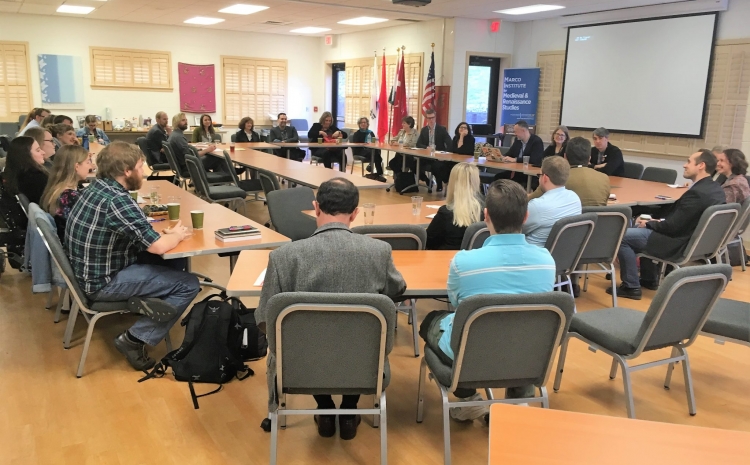20th Annual Marco Symposium
“Local and Global Perspectives on Materiality in the Premodern World“
March 7-8, 2025
The Mill Room, Cherokee Mills
2240 Sutherland Avenue
Knoxville, TN 37928
The Marco Symposium is the Institute’s premier annual event, and is held every year
in March or April. The Symposium brings leading experts in their field to the University
of Tennessee for two days of talks on that year’s theme, and concludes with a roundtable
discussion by all the participants. The topic of the 20th annual Marco Symposium
is Local and Global Perspectives on Materiality in the Premodern World, organized
by Stephen Collins-Elliott (Classics) and Megan Bryson (Religious Studies).
This year’s Symposium explores different definitions of materiality and objecthood,
developing a new vocabulary of understanding in local and global perspectives in the
premodern world from antiquity to the early modern period. Presentations examine
object-driven narratives through multidisciplinary case-studies, asking how our
understanding of the past changes when we treat human relationships as entangled
with objects. More specifically, this symposium aims to bridge disparate contexts by
drawing together the ways in which local societies have approached their material
entanglements, toward highlighting how each case-study can inform new theoretical
positions and methodological approaches toward our understanding other past
contexts.
Symposium Schedule
Friday, March 7
10:00am Welcome and Opening Remarks
Anne-Hélène Miller, Riggsby Director
10:30-11:45am Session 1: Materiality & Encoding Agency
Chair: Megan Bryson (Religious Studies)
- Claudia Brittenham (University of Chicago), “On the Consent of Stones: Sculpture and Place in the Ancient Maya World”
- Elizabeth A. Cecil (Florida State University), “Pūrnavarman’s Prints: Materiality, Kingship, and Environmental Entanglement in Early West Java”
1:30-2:45pm Session 2: Materiality & Ritual Transformation
Chair: Suzanne Wright (School of Art)
- Carolyn Wargula (Bucknell University), “From Mourning to Rebirth: The Poetics of Thread and Hair in Premodern Japanese Buddhist Embroideries”
- Yuhang Li (University of Wisconsin-Madison), “Articulating Empire Through Ephemeral Objects in Early Modern China”
Saturday, March 8
9:00am Welcome and Opening Remarks
Beauvais Lyons, Divisional Dean of Arts & Humanities
9:15-10:30am Session 3: Materiality & Ritual Efficacy
Chair: Stephen Collins-Elliott (Classics)
- Michael Naparstek (University of Tennessee, Knoxville), “From This Becomes Real: Ming Dynasty Daoist Ritual and Visual Culture within an Ecology of Efficacy”
- Reema Habib (University of Tennessee, Knoxville), “Between a Rock and the Written Word: Ruminations on the Object versus the Inscription in Ancient Greek Magic”
10:45am-12:00pm Session 4: Materiality & Time
Nathan Reeves (Global Studies)
- Ömür Harmanşah (University of Illinois Chicago), “Materiality and Temporality of the Future Artifact”
- Catherine Walsh (University of Montevallo), “Stony Substances and Tangled Time in Sixteenth-Century Italian Sculptures”
1:00-2:15pm Session 5: Materiality & Cross-Cultural Connection
Sean Roberts (School of Art)
- Marian H. Feldman (Johns Hopkins University), “Goddesses, Textiles, and Ivory: A Materiality-Based Approach to a 13th-century BCE Carved Ivory Lid from a Syrian Port City”
- Duygu Yıldırım (University of Tennessee, Knoxville, “From Tunis to Florence: Materiality, Everyday Encounters, and the Limits of Knowledge”
2:45-4:00pm Roundtable Discussion
Keynote Lecture
“On Objects, People, Practices, and Power: The Study of Materiality, Past, Present, and Future”
Andrew Gardner (University College London)
Friday, March 7, 2025, 5:30pm
Lindsay Young Auditorium, Hodges Library
University of Tennessee, Knoxville
Registration Information:
The 2025 symposium will be held in person in the Mill Room at Cherokee Mills, 2240 Sutherland Avenue. The keynote will be held in the Lindsay Young Auditorium at Hodges Library on the campus of the University of Tennessee, Knoxville. All events are free and open to the public.
Please email marco@utk.edu with questions.
About the annual Marco Symposium
The Marco Symposium is held every year in March or April. The Symposium brings leading experts in their field to the University of Tennessee for two days of talks on that year’s theme. A round-table discussion by all the participants concludes the weekend.
The Symposium is Marco’s signature event of the year, and typically attracts members of the larger Knoxville community in addition to students and faculty at UT and scholars from across the region. The theme of the Symposium changes each year. Faculty who are interested in submitting a proposal should contact marco@utk.edu
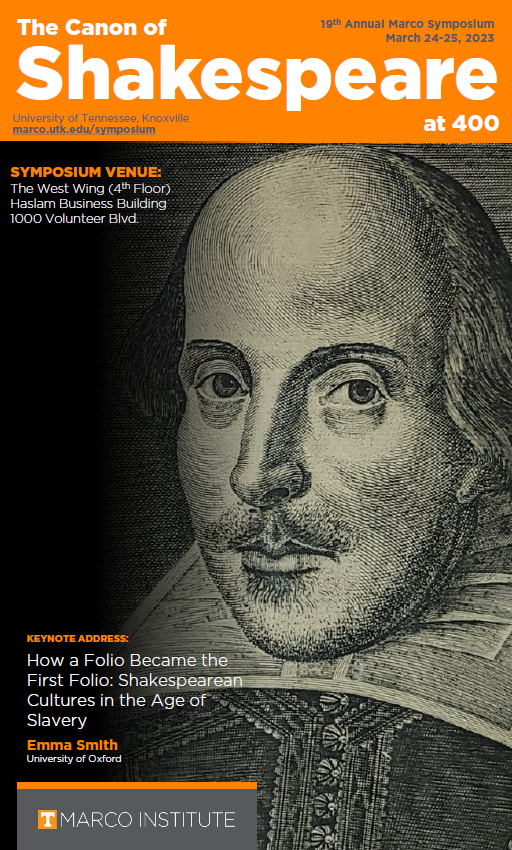 |
2023 Marco Symposium |
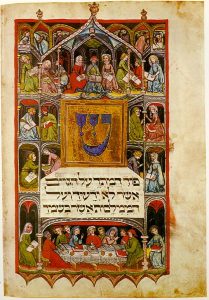 |
2022 Marco Symposium “Religious Communities Across Space and Time in Africa, Europe, and the Middle East” |
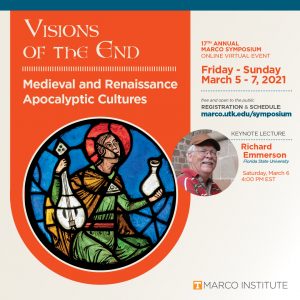 |
2020/2021 Marco Symposium Visions of the End: Medieval & Renaissance Apocalyptic Cultures |
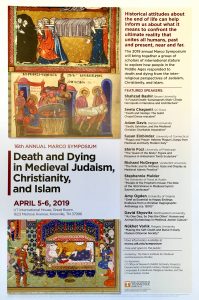 |
2019 Marco Symposium Death and Dying in Medieval Judaism, Christianity, and Islam |
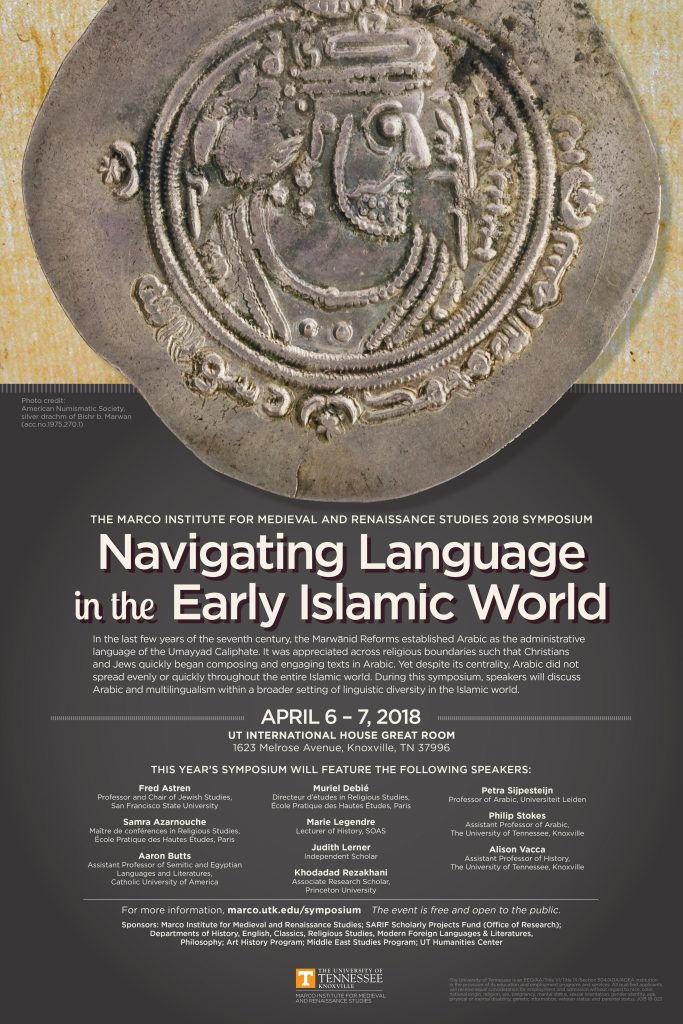 |
2018 Marco Symposium |
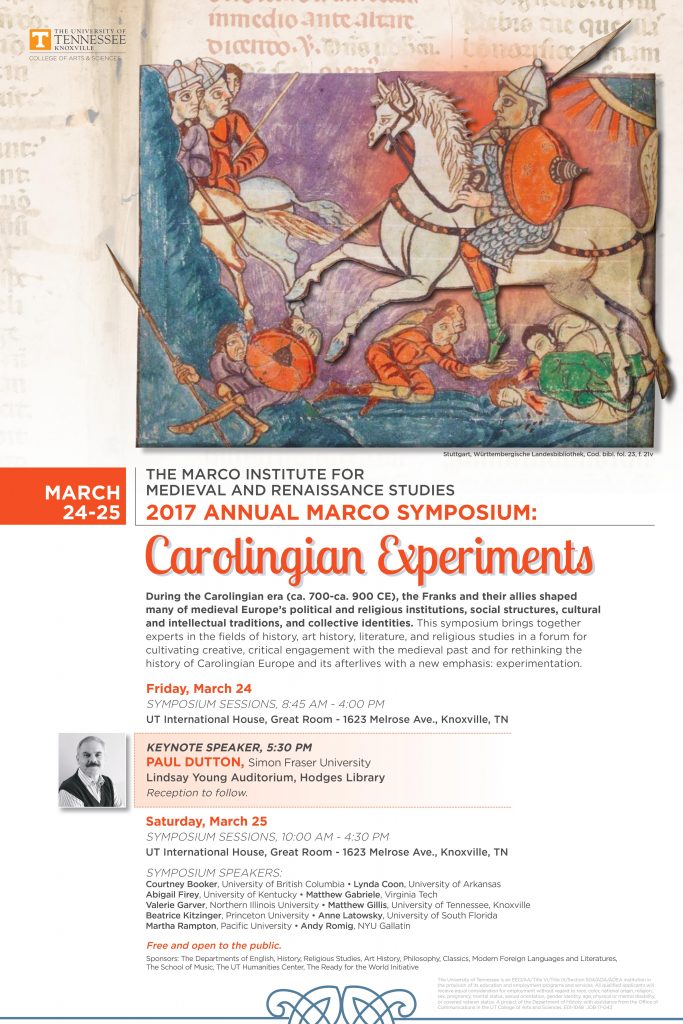 |
2017 Marco Symposium |
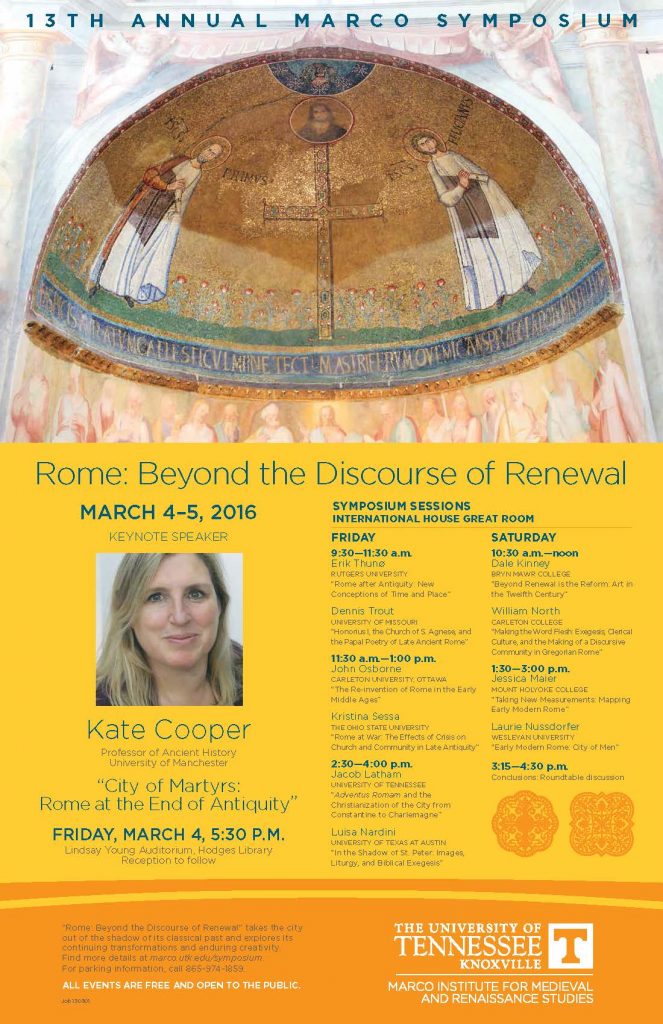 |
2016 Marco Symposium Rome: Beyond the Discourse of Renewal |
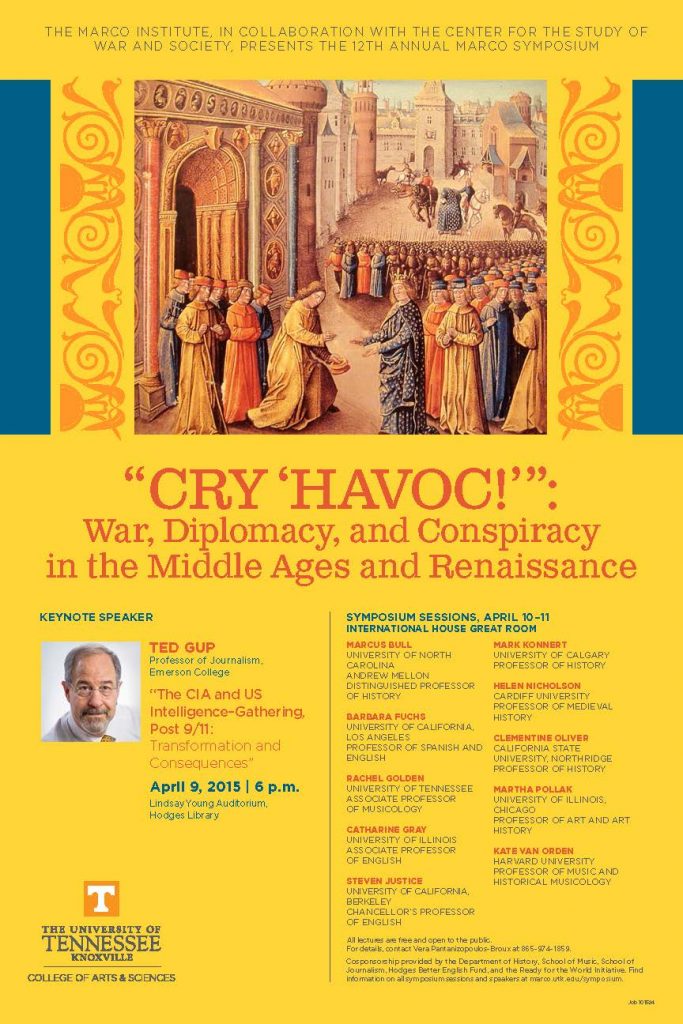 |
2015 Marco Symposium ‘Cry Havoc!’: War, Diplomacy and Conspiracy in the Middle Ages and Renaissance |
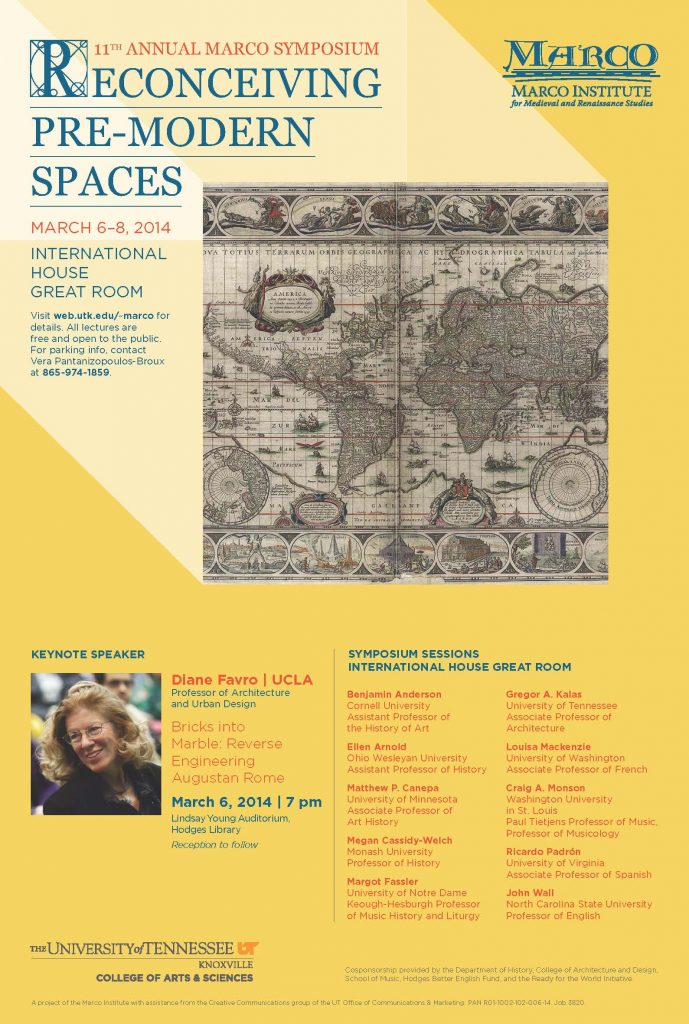 |
2014 Marco Symposium Reconceiving Pre-Modern Spaces |
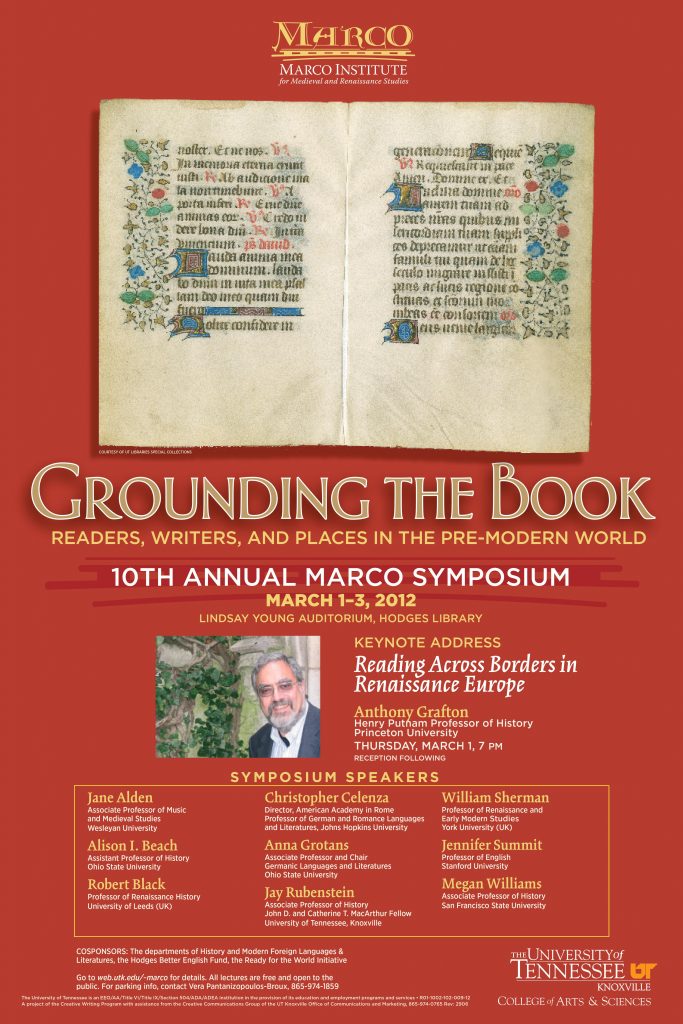 |
2012 Marco Symposium Grounding the Book: Readers, Writers, and Places in the Pre-Modern World |
 |
2011 Marco Symposium Gardens, Real and Imagined |
 |
2010 Marco Symposium The Building Blocks of France |
 |
2009 Marco Symposium Humanism and Its Economies |
 |
2007 Marco Symposium Saints & Citizens: Religion and Politics in the Middle Ages and the Renaissance |
 |
2006 Marco Symposium The Book of Travels: Genre, Ethnology, Pilgrimage from 1250-1650 |
 |
2005 Marco Symposium Interactions and Images: Cultural Contacts Across Eurasia, 600-1600 |
 |
2004 Marco Symposium Spectacle and Public Performance in the Middle Ages and the Renaissance |
 |
2003 Marco Symposium Books and Readers in the Middle Ages and the Renaissance |
 |
2002 Marco Symposium Scripture and Pluralism: The Study of the Bible in the Sectarian Worlds of the Middle Ages and Renaissance |
